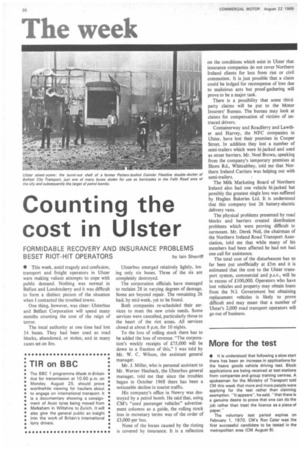Counting the cost in Ulster
Page 22

If you've noticed an error in this article please click here to report it so we can fix it.
FORMIDABLE RECOVERY AND INSURANCE PROBLEMS BESET RIOT-HIT OPERATORS
by lain Sherriff
• This week, amid tragedy and confusion, transport and freight operators in Ulster were making valiant attempts to cope with public demand. Nothing was normal in Belfast and Londonderry and it was difficult to form a distinct picture of the situation when I contacted the troubled towns.
One thing, however, was clear: Ulsterbus and Belfast Corporation will spend many months counting the cost of the reign of terror.
The local authority at one time had lost 54 buses. They had been used as road blocks, abandoned, or stolen, and in many cases set on fire. Ulsterbus emerged relatively lightly, losing only six buses. Three of the six are completely destroyed.
The corporation officials have managed to reclaim 28 in varying degrees of damage. Some are beyond repair. The remaining 26 had, by mid-week, yet to be found.
Both companies re-scheduled their services to meet the new crisis needs. Some services were cancelled, particularly those to the heart of the riot areas. All services closed at about 8 p.m. for 10 nights.
To the loss of rolling stock there has to be added the loss of revenue. "The corporation's weekly receipts of £75,000 will be down to a fraction of this," I was told by Mr. W. C. Wilson, the assistant general manager.
Mr. J. Miller, who is personal assistant to Mr. Werner Heubeck, the Ulsterbus general manager, told me that since the troubles began in October 1968 there has been a noticeable decline in tourist traffic.
His company's office in Newry was destroyed by a petrol bomb. He said that, using CM's "used passenger vehicles" advertisement columns as a guide, the rolling stock loss in monetary terms was of the order of £3,000 per bus.
None of the losses caused by the rioting is covered by insurance. It is a reflection on the conditions which exist in Ulster that insurance companies do not cover Northern Ireland clients for loss from riot or civil commotion. It is just possible that a claim could be lodged for recompense of loss due to malicious acts but proof-gathering will prove to be a major task.
There is a possibility that some thirdparty claims will be put to the Motor Insurers' Bureau. The bureau may look at claims for compensation of victims of untraced drivers.
Containerway and Roadferry and Lawther and Harvey, the NFC companies in Ulster, have lost their premises in Cooper Street. In addition they lost a number of semi-trailers which were hi-jacked and used as street barriers. Mr. Noel Brown, speaking from the company's temporary premises at Shore Rd., Whiteabbey, told me that Northern Ireland Carriers was helping out with semi-trailers.
The Milk Marketing Board of Northern Ireland also had one vehicle hi-jacked but possibly the greatest single loss was suffered by Hughes Bakeries Ltd. It is understood that this company lost 26 battery-electric delivery vans.
The physical problems presented by road blocks and barriers created distribution problems which were proving difficult to surmount. Mr. Derek Neil, the chairman of the Northern Ireland Road Transport Association, told me that while many of his members had been affected he had not had one call for assistance.
The total cost of the disturbances has so far been put unofficially at £5m and it is estimated that the cost to the Ulster transport system, commercial and p.s.v., will be in excess of £100,000. Operators who have lost vehicles and property may obtain loans from the N.I. Government but obtaining replacement vehicles is likely to prove difficult and may mean that a number of Ulster's 2,000 road transport operators will go out of business.
















































































































